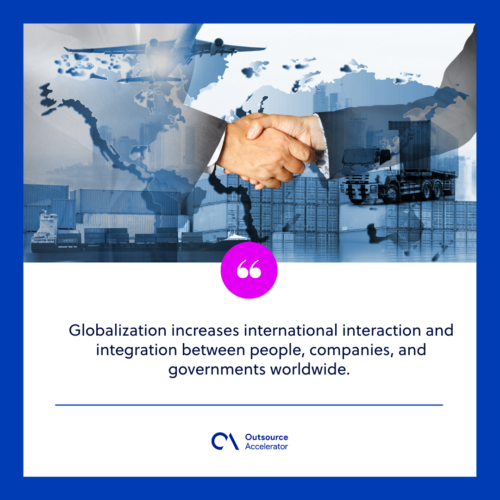10 key benefits of globalization

Globalization has been a major player in forming the modern world.
Today, people are more connected than ever; goods can be exchanged at a record frequency, and issues that plague nations reach anyone with a screen.
The international stage is open to everyone, not just developed countries.
There have been many benefits to globalization. Organizations have seen this and made it an integral part of their operations[1].
In this article, we’ll review the common benefits that globalization has produced.
What is globalization?
Globalization increases international interaction and integration between people, companies, and governments worldwide. This term describes various phenomena, including the increasingly global flow of goods, money, and people.
Globalization includes international trade, finance, media flows, migration, and cultural exchange. Many scholars have noted that globalization is now a primary feature of the world economy.
Globalization began in the 19th century primarily as an economic process of integration and convergence.
Its growth later coincided with the Industrial Revolution[2]. It has heavily accelerated since the 1970s due to advances in transportation and telecommunication.

Major types of globalization
Globalization is a broad term that encompasses multiple sectors. This article lists three major types – but there are also more – each with its benefits and challenges.
Economic globalization
Economic globalization is the increasing integration of national economies into the international economy. This is done by reducing barriers to international trade, such as heavy tariff laws.
Economic globalization includes many aspects related to finance and economic growth. The benefits of globalization include focusing on production, markets, labor, technology, corporations, and capital.
Cultural globalization
Cultural globalization is the spread of cultural norms from one society to another. It includes diffusions from one society to another and internal cultural diversity within a community.
The benefits of cultural globalization have historically tended to be slanted in favor of Western cultures[3]. Western consumerism and mass media have been used to spread their cultural influence worldwide.
There have been multiple benefits to the intense “Westernization” of globalization. Unfortunately, it has also resulted in the loss of many traditional ways of living for non-Western societies.
Ecological globalization
Ecological globalization refers to the increasing integration of the world’s ecosystems due to human activity. It has occurred through many different mechanisms, including the following:
- Trade
- Travel
- Mass migration
- Technological advances (e.g., pollution and climate change)
While some scholars have focused on the potential negative impacts of ecological globalization, others have explored its benefits.
Some studies have argued that ecological globalization has led to increased environmental awareness and activism[4] in both developed countries and developing nations.
10 benefits of globalization
Though controversial at times, globalization has had many benefits, both on the large scale and small scale.
Here are some of the benefits of globalization that proponents have observed.
1. Higher revenue flow
A major benefit of globalization is its contribution to increased revenue flow. Globalization facilitates international trade, which generates more jobs and higher income per capita.
Globalization opens up investment opportunities for companies seeking lucrative markets with high-profit margins. These companies often find higher returns on investments (ROIs) than those operating within their country’s borders.
2. Lower costs
Globalization allows companies to cut costs by outsourcing work to countries with low labor costs. This is a huge benefit for small businesses that cannot afford to employ expensive labor or technology in their operations.
In addition to having access to more customers, companies can sell their products more cheaply. Cheaper labor also means more affordable manufacturing costs, enabling companies to save money in production.
3. Access to new cultures and markets
Globalization helps companies find new product and service markets by expanding their reach beyond national borders. Companies can expand their business worldwide with less risk involved than selling locally.
Another benefit of globalization is increased trade, which has led to greater access to goods from all over the world. This has created a more diverse marketplace for consumers and an opportunity for businesses to reach new customers.
Additionally, the Internet has made it possible for people in different countries to communicate with one another and interact on social media sites. This enables them to learn about other cultures and customs firsthand.
Finally, another benefit of globalization is it has led to an increase in immigration rates around the world. This has led to diffusions of cultures and developments of new market audiences.
4. Finding better product and market fit
A significant benefit of globalization is finding a better product and market fit. The demand for products varies greatly from country to country. By expanding their business across borders, organizations can better find an area with a high demand for their product.
Companies find testing their product in these regions advantageous before scaling up. This method benefits them by saving time and money on localization efforts that may not yield results.
Alternatively, an added benefit of globalization is the importation and adaptation of ideas from other countries. This allows companies to develop new products and services that fit better with their home market.

5. Evading market saturation
As economies become more globalized, they also become more resilient to local economic conditions. When an economy becomes saturated with a specific product or service, it has no choice but to look elsewhere for more customers.
This benefit allows access to new markets where they can sell more goods without competing with other established companies. Because the efforts of competing companies have not yet reached those markets, a benefit of globalization is reaching new people with their products.
Global markets are often less saturated than local ones and tend to be more profitable. Smaller companies and countries, in particular, can target those markets overlooked by larger ones.
6. Diverse talent pool and workforce
One of the primary benefits of globalization is that it allows companies to hire employees from all over the world. Hiring global professionals brings different skills and experiences to the table.
An American company might hire someone from India with experience working with software systems. This outsourcing strategy helps them save money and utilize the talents of diverse global professionals.
Diversity also means having access to employees who represent different ethnicities or cultures. This can help your business reach out to new markets or demographics previously ignored or underserved by other companies in your industry.
A business’ visibility can be significantly raised among potential customers. The benefit of a diversified staff is that it gives the image that you are there for everyone regardless of race, ethnicity, or gender orientation.
7. Economic growth
The economic growth experienced by countries during periods of globalization is often cited as one of its biggest benefits. One reason is that consumers can afford to buy more things when more products are available at lower prices.
This increased demand leads to better production and employment opportunities for workers who produce these products.
Globalization has also led to increased free trade, positively affecting economic growth. Countries that trade with one another enjoy higher standards of living than those that don’t.
Trade allows them to specialize in what they do best, increasing production and greater wealth.
8. Collaboration in knowledge and technology
An important benefit of globalization is the increased flow of knowledge and technologies between countries, leading to increased innovation. Countries can share resources, ideas, and experiences more efficiently than ever in an increasingly interconnected world.
When companies collaborate, they can share knowledge and technology. This allows each company to benefit from its experience and expertise.
Collaboration also makes companies more efficient in their business practices by sharing resources, reducing waste, and increasing productivity.
The Internet is a crucial driver of globalization, allowing people worldwide to connect and collaborate on ideas, products, and services.
Globalization would not have made such giant strides were it not for the online communication of information the Internet provides.

9. Competitive advantage
Competitive advantage is also seen as a benefit of globalization. Lower transportation costs result in greater competition among suppliers and distributors. This means that businesses may have access to lower prices than they would with limited competition.
Increased competition from suppliers also means better quality goods at lower consumer prices. Some companies may experience difficulty competing against foreign suppliers due to differences in language or culture.
However, this is often offset by lower transportation costs for consumers who want access to a broader range of goods.
10. Developing universal standards
Finally, a benefit of globalization is the development of universal standards for goods and services. Consumers can compare products from different countries, making finding what they want at the best price easier.
Universal standards like safety regulations and quality standards ensure that products worldwide meet an equal level.
This means that consumers may have more confidence in purchasing goods from other countries since they know what they are getting is safe. Countries may then build new markets that promote the quality of goods and services.
Overcoming globalization challenges
Globalization brings immense opportunities for those in global business to expand their reach and tap into new markets. However, it also presents unique challenges that companies must prevail over to thrive in this new economy.
Overcoming the challenges posed by globalization requires a concerted effort on both national and international levels. These drawbacks encompass cultural and language barriers to regulatory compliance and supply chain complexities.
Solving these hurdles necessitates a commitment to responsible practices, inclusive policies, and a shared dedication to building the global economy and community.
The future of globalization
As technology continues to advance and innovations in business and economics continue to be made, the concept of globalization will continue. It has had many hurdles and criticisms, but it’s continued to soldier on, producing many benefits as well.
Globalization has produced large-scale changes, and many groups, even down to the individual level, have felt some positive consequences, whether they’re aware of it or not.
As the world becomes more connected, it is up to the primary movers to ensure that processes are done correctly. The world has a massive stock of scientists, environmentalists, and moral advocates that can be utilized to guide globalization properly.
The trend of globalization may not be to disappear but to evolve. As the world itself changes, the concept of globalization must also remain dynamic.
This primarily means finding new ways to keep the benefits while minimizing the negative effects.
References
- Operations.Ristovska, K. and Ristovska, A., 2014. The impact of globalization on the business. Economic Analysis, 47(3-4), pp.83-89.
- Industrial Revolution. Ferreira, P.C., Pessoa, S. and Dos Santos, M.R., 2016. Globalization and the industrial revolution. Macroeconomic Dynamics, 20(3), pp.643-666.
- Western cultures. Magu, S., 2015. Reconceptualizing cultural globalization: Connecting the “cultural global” and the “cultural local”. Social Sciences, 4(3), pp.630-645.
- Increased environmental awareness and activism. Zhang, L., Xu, M., Chen, H., Li, Y. and Chen, S., 2022. Globalization, Green Economy and Environmental Challenges: State of the Art Review for Practical Implications. Front. Environ. Sci, 10, p.870271.







 Independent
Independent




